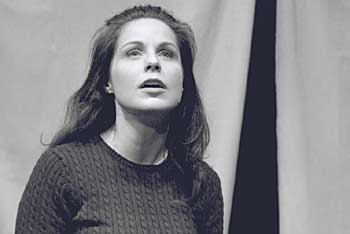![[Metroactive Stage]](/stage/gifs/stage468.gif)
[ Stage Index | Silicon Valley | Metroactive Home | Archives ]

Photograph by Christy Scherrer A Mother's Tale: Barbara Kritzer plays one of seven women who tell their stories in 'Birth.' Baby Business City Lights and BABI look at life from the beginning By Marianne Messina AND YOU thought sex was a hot button-issue. Judging from Karen Brody's play Birth, currently at City Lights, the entire cultural ethos—from mores to neuroses—comes down on the issues around giving birth. Produced in part by Bay Area Birth Information (BABI), the play distills playwright Karen Brody's interviews with 100-plus mothers into seven characters who tell us their birthing stories like veterans of a momentous war—what they expected, what they wanted and what they actually got for an experience. On their path to a healthy baby, the women are inundated with questions: epidural or not, C-section or not, natural vs. medical, instinct vs. ignorance. In a blizzard of information, the play touches on gender politics, doulas, midwives, failures of the medical profession, failures of "plan A." It also seems to be asking whether you have to have pain to be totally "present" in the birth experience. The seven-woman cast sits lined on either of two benches, each made from boxes, with a couple of stools added in so the storyteller of the moment can take center stage. The women play a variety of colorful characters, including husbands, taxi drivers, mothers-in-law, girlfriends, doctors and midwives. Beth (Shelly Smith), a type-A business woman in a pantsuit, schedules her C-section for exactly 8am on a Monday morning; Jillian (Patricia Madden), the earthy woman in long skirt and jeans jacket, discovers "the empowering epidural"; no-nonsense Vanessa (a cute and vivacious Kristi Katerra Martin) wants to tell her husband and his family (who are watching football during her delivery) to "get the fuck out." "If I didn't have the epidural," Vanessa says, "the whole birth scene was gonna get ugly." Anne Younan as the upbeat Lisa in orange corduroy jeans wants midwives to deliver her baby, but says, "There seemed to be no faith in me" and "I just needed someone on my side." Younan also plays a notable mother with home-spun advice and a grating Midwestern accent. The stools and boxes are shuffled and piled to make various birthing setups, a taxi, a hospital gurney (Adrian Stapleton, set designer). And everything from boxes to backdrop to floor is colored like Easter, in pastels of peach, pink, orchid. (Caution: nurture imagery ahead; primary colors keep out.) Although the effects were minimal throughout the show, director Ross Nelson (and co-director Patricia Madden) made an exception for the Cesarean section—Lisa (Younan), with a breach baby, is draped from the waist down in a black satin sheet ("So I could disassociate myself from my lower body"), and the lights go down until everything is in shadows as she narrates, "I could hear the knife, I could smell it, too." This device clarifies things for anyone not up on their birthing politics: C-section, bad. I brought a friend in her second trimester to the show, and though the play tries in general to keep any blatant agenda under control, she was appalled at the absence of or disregard for husbands and the apparent disdain for the traditional medical profession. And the play has an obviously limited scope—a white-bread cast, no hint of ambivalence, much less negativity about having a baby, the gaping absence of women without health coverage and the means to hire three midwives and a doula. But with the ever-charged and wondrous topic, the multiverse of fascinating experiences told by talented actors, Birth doesn't fail to be eye-opening and certainly a springboard for passionate discussion.
Birth, presented by City Lights Theater Company and Bay Area Birth Information, plays Wednesday-Sat at 8pm and Sunday at 2 and 7pm through March 5 at City Lights, 529 S. Second St., San Jose. Tickets are $25 (discounts available for students and seniors.) (408.295.4200)
Send a letter to the editor about this story to letters@metronews.com. [ Silicon Valley | Metroactive Home | Archives ]
|
From the March 1-7, 2006 issue of Metro, Silicon Valley's Weekly Newspaper.
Copyright © 2006 Metro Publishing Inc. Metroactive is affiliated with the Boulevards Network.
For more information about the San Jose/Silicon Valley area, visit sanjose.com.